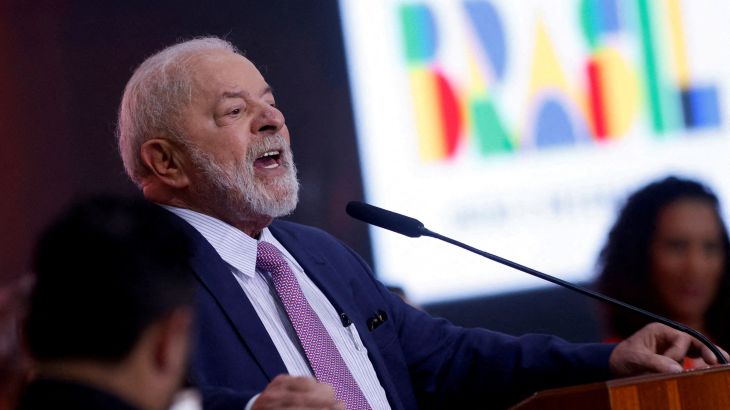Brazil’s Lula heads to China hoping to boost trade, investments
Brazilian president, who is taking an enormous delegation to China, also aims to re-assert Brazil’s place on global stage.

Brazilian President Luiz Inacio Lula da Silva is headed to China, as the left-wing leader hopes to bolster economic ties to Brazil’s largest trading partner and re-establish the South American nation’s role in global diplomacy.
Lula posted photos on social media on Tuesday morning in front of a plane on a tarmac alongside Vice President Geraldo Alckmin, saying he was embarking on the trip.
Keep reading
list of 3 itemsCan Lula save the Amazon?
Brazil’s Lula postpones China trip after catching pneumonia
“We will consolidate our relationship with China,” the Brazilian president told the Voz do Brasil radio programme on the eve of his departure.
“I will invite [Chinese President] Xi Jinping to Brazil for a bilateral meeting to show him projects for which we want to attract Chinese investment,” he added, without elaborating on when Xi’s potential visit would take place.
Bom dia. Embarcando para a China. 11h de diferença no fuso. Prontos para acompanhar as agendas? 🇧🇷✈️🇨🇳
📸: @ricardostuckert pic.twitter.com/99QrtTT2Yf
— Lula (@LulaOficial) April 11, 2023
Lula’s trip to China, which was delayed after he caught pneumonia, came about two months after he travelled to Washington, DC, to meet with US President Joe Biden.
The Brazilian leader, whose administration recently passed the 100-day mark, has been seeking to reset the country’s relationships with allies, many of which were tested under his far-right predecessor, Jair Bolsonaro.
Experts have said Lula also is trying to “carve out … a distinctive role” for Brazil in global geopolitics – maintaining ties with Washington, while also with its rivals, including China and Russia.
Lula was expected to arrive in China on Wednesday at the head of a large delegation made up of dozens of political representatives, as well as about 240 Brazilian business leaders.
He will attend a swearing-in ceremony on Thursday in Shanghai for former Brazilian President Dilma Rousseff, who was recently elected to lead the New Development Bank of the BRICS economic bloc, made up of Brazil, Russia, India, China and South Africa.
And Lula will meet his Chinese counterpart, Xi, in Beijing on Friday.
“The fact that President Lula da Silva will lead a large delegation to China on his state visit so soon after his recovery speaks to the high importance both sides attach to this visit and our bilateral relations,” Chinese foreign ministry spokesperson Wang Wenbin said during a news conference on Tuesday.
“China stands ready to work together with the Brazilian side and take this visit as an opportunity to upgrade our mutually beneficial, friendly cooperation in various sectors and bring more positive energy to developing countries’ solidarity, cooperation and joint response to global challenges.”
Ties strained under Bolsonaro
Brazil-China ties were strained under former Brazilian President Bolsonaro, who won the country’s 2018 election after campaigning on anti-China rhetoric.
During his time in office, Bolsonaro also stood firmly behind the United States under former President Donald Trump, who made US competition with China a key pillar of his foreign policy.
“This confrontational dynamic is a marked departure from the historical trend in Brazil-China relations, which has trended toward deeper economic and political relations,” Harold Trinkunas, deputy director at the Center for International Security and Cooperation at Stanford University, wrote in 2020 about the tensions at the time.
However, Trinkunas pointed out that “China has a long-term interest in a close diplomatic relationship with Brazil, important both for its strategy in Latin America and maximizing its global leadership.”
And Brazil also “has important long-term strategic interests in maintaining a working partnership with China”, he added.
Indeed, bilateral trade between China and Brazil totalled $150bn in 2022 – an increase of 10.1 percent compared with the previous year, S&P Global Market Intelligence analysts Ailsa Rosales and Alejandro Duran Carrete wrote in a briefing note on April 6.
Brazil mainly exports iron ore, soybeans and crude petroleum to China, while semiconductor devices account for the largest share of Chinese exports to the Brazilian market, according to data compiled by the Observatory of Economic Complexity.
Earlier this year, China and Brazil also moved to reduce the dominance of the dollar by signing an agreement on setting up yuan clearing house arrangements that would facilitate bilateral trade and investment – a reflection of growing ties.
Negotiations during Lula’s trip to China also are expected to “cover state cooperation, including strengthening technological knowledge sharing and the construction of a satellite to support Amazon conservation”, S&P’s Rosales and Duran Carrete said.
“China-Brazil relations are likely to remain a key component of President Xi’s foreign policy, which has emphasised securing trade routes and building strategic alliances with emerging economies through signature initiatives such as the Belt and Road Initiative, of which Brazil is not yet a formal member, and the Global Development Initiative,” they wrote.
War in Ukraine
Meanwhile, Lula has said he also planned to suggest mediating peace talks between Russia and Ukraine during his meeting with Xi on Friday. Among Western leaders, the proposal has only been welcomed by French President Emmanuel Macron so far.
“I am convinced that both Ukraine and Russia are waiting for someone else to say, ‘Let’s sit down and talk,'” Lula told reporters last week.
He has suggested a solution could be the return of newly invaded territory, though not Crimea – an option that Ukrainian President Volodymyr Zelenskyy has rejected outright.
“Lula knows that China is the only country Russia will listen to,” a European diplomat in Brasilia told the Reuters news agency on condition of anonymity.
“People are waiting to see if it gets some traction from other countries, like France and Germany.”